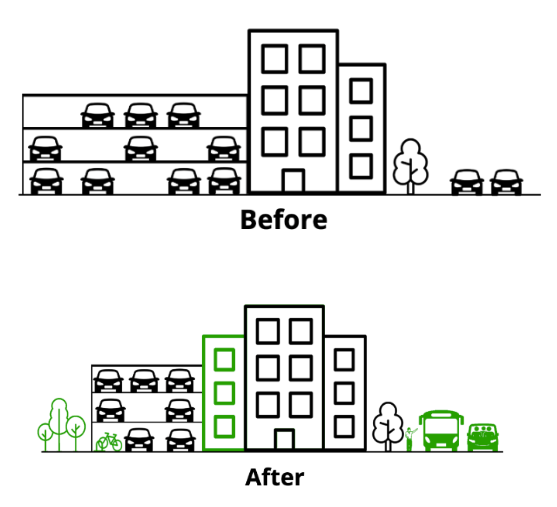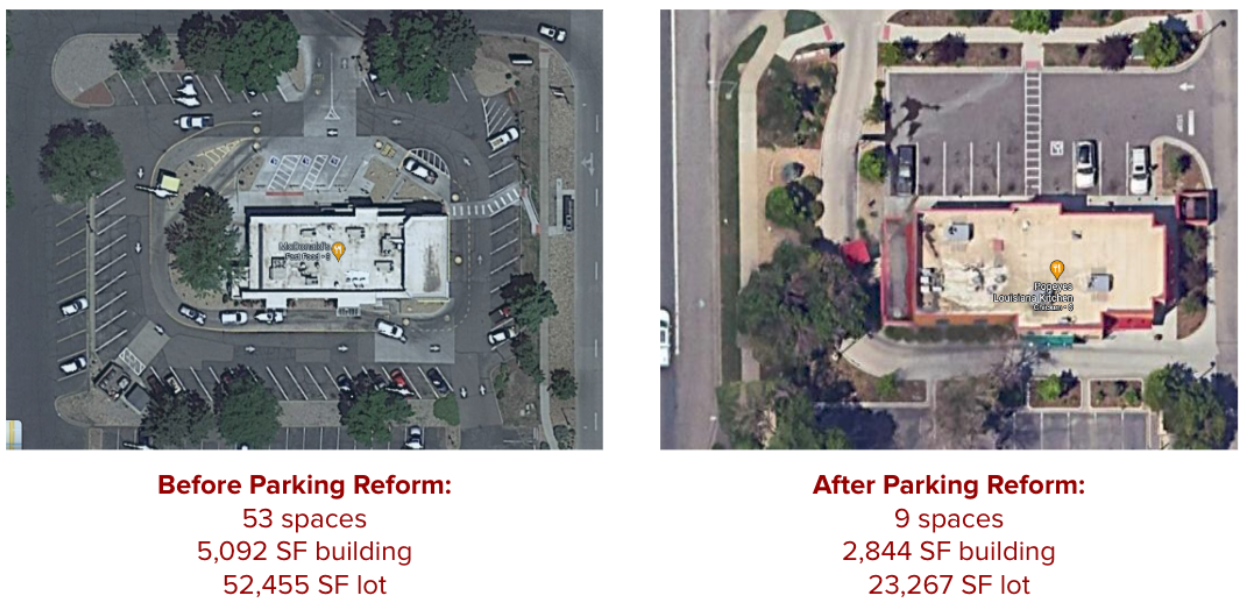FOR IMMEDIATE RELEASE
May 29, 2024
Contact:
Matt Frommer, SWEEP | [email protected]
__________
[LONGMONT, CO] – Last night, in a significant win for housing and climate, the Longmont City Council voted unanimously to eliminate minimum parking requirements for new development and replace them with parking maximums. The policy change will advance city efforts to reduce housing costs, support economic development, and cut transportation pollution by enabling more affordable and sustainable forms of transportation like walking, biking, and transit.
According to the Parking Reform Network, Longmont joins 74 cities across the U.S. in eliminating parking minimums and is the first non-coastal city in the American West.
The decision comes just weeks after Governor Polis signed House Bill 24-1304, which eliminates parking minimums for new multifamily housing near rail stations and bus stops. After considering multiple options, Longmont decided to go above and beyond the new state law by removing parking minimums altogether – a solution that’s easier for the city to administer and more consistent with city goals.
For decades, local governments around the U.S. have mandated a minimum number of off-street parking spaces for new housing, commercial, retail, and other projects. Research shows that such mandates are extremely costly, adding roughly $50,000 per parking space in a structured garage — expenses that are typically passed on to residents and customers.
The high cost and spatial requirements of parking mandates often limit the supply and financial feasibility of housing development. This has exacerbated the housing affordability crisis in Colorado, which is now the second most expensive state for housing in the American West. Excessive parking minimums have also led to an oversupply of parking, with some estimates indicating there are eight parking spaces for every one car in the U.S.

Source: Boston Metropolitan Area Planning Council (MPAC): Perfect Fit Parking
“This policy change puts people over parking but still gives developers the ability to choose the amount of parking they need versus the amount the City feels they should have,” said Ben Ortiz, Transportation Planner with the City of Longmont. “While city staff recognize that people own cars and need places to store them, not everyone chooses to own a car or can afford one. For these individuals, eliminating minimum parking requirements will be particularly beneficial, as the cost of parking increases the costs of goods, services, and housing for everyone, including those who do not drive.”
Longmont’s history with parking reform dates back more than a decade. In the early 2010s, city planners noticed that several prime locations for commercial development along Main Street were sitting empty. Upon further investigation, they discovered that some of these lots were too small to accommodate both a restaurant and the mandated amount of parking, which can take up more than 80% of the lot area. In 2014, the city decided to eliminate commercial parking minimums, which immediately enabled new commercial development around the city. Importantly, the city replaced parking minimums with maximums to prevent developers from overbuilding their parking lots.

In 2021, the City collaborated with a graduate student to measure parking utilization at existing multifamily housing properties in Longmont. According to the study, 15-50% of parking spaces at the surveyed housing properties were unused during peak periods. The report suggests that parking mandates undermine city goals to expand housing options, improve bicycle and pedestrian connectivity, reduce pollution and single-occupancy vehicle trips, promote economic development, and prevent sprawl. This prompted the city to remove parking minimums for new multifamily residential developments in Downtown Longmont in 2022.
Replacing parking minimums with maximums flips the traditional paradigm on its head. While many other cities in Colorado require two or more parking spaces for each new apartment, Longmont’s new code sets a cap at two spaces per home. Instead of forcing developers to build more parking than necessary, the city’s new code sets the default at less parking and requires developers to prove they need more parking in certain circumstances.
Cities and counties in Metropolitan Planning Organizations, the five major urban areas in Colorado, must comply with HB24-1304 by June 30, 2025. Those who want to create more walkable, efficient, and climate-friendly communities should look to Longmont’s new parking code as the gold standard in Colorado.
For more information about the benefits of parking reform, see SWEEP’s slide deck, webinar recording, and fact sheet for HB24-1304.
###
The Southwest Energy Efficiency Project (SWEEP) is a public interest organization promoting greater energy efficiency and clean transportation in Arizona, Colorado, Nevada, New Mexico, Utah, and Wyoming. swenergy.org

